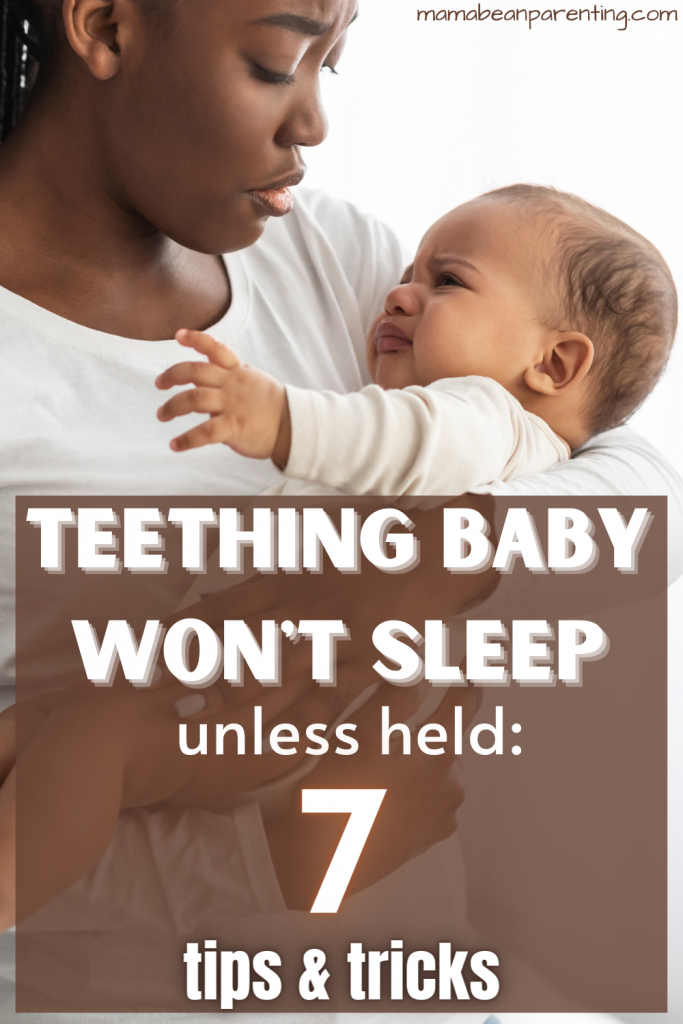Another sleepless night? The teething phase begins at around six to ten months and usually lasts until your baby’s third birthday. So, what can you do when your teething baby won’t sleep unless held? There’s a lot that you can do to make the process easier.
Nevertheless, teething doesn’t officially end until your baby grows permanent molars.
Keep in mind that it’s not always painful. Most of the discomfort subsides somewhere between the age of two and three. Nonetheless, an individual tooth can cause pain for a certain period of time, which leads to crying, fussiness and trouble falling asleep.
As parents, you can do a lot to ease your baby’s pain.
However, it helps to know what teething is, exactly. So, before we get into what you can do to help your baby, we’re going to examine teething symptoms and signs of teething, as well, so that you can familiarize yourself with all the challenges that lie ahead.
Signs of Teething in Babies

As always, preparation is key. Some babies experience teething sooner rather than later, but the general rule of thumb tells us that teething begins around four to eight months.
A tooth can occasionally appear with no pain or discomfort. That may lead you to wrongly believe that your baby’s failing to express their discomfort. Rest assured that it’s entirely possible for a tooth to emerge without causing any teething symptoms in your baby.
Nevertheless, you would be wise to expect many signs of teething.
Before we get into all the details, here’s a quick overview of baby teething symptoms:
- Your baby’s rubbing their ear.
- Chewing and gnawing more than usual.
- Your baby’s dribbling more than what you’re used to.
- Examine your baby’s gum. Is it sore and red?
- Check to see if their cheek is flushed.
- Your baby’s finding it hard to fall asleep.
- They’re running a low-grade fever.
- Your baby’s expressing irritation and discomfort.
- They’re coughing.
- Teething can cause rashes, too.
Be on the lookout for these signs of teething around six months.
Your baby’s going to experience some sort of irritation when its teeth start erupting through its gums. Luckily, there’s a lot that you can do to relieve their discomfort.
If your baby’s biting, gnawing and chewing more than usual, it means that the teething symptoms have started to show. Babies chew and bite when they’re experiencing teething because it temporarily alleviates pressure from under the gums.
You can provide a cold washcloth, for example, or a teething toy to help them.
Keep in mind that it’s not unusual for babies to eat less when teething.
You may also be wondering why your baby’s rubbing their ear. What do ears have in common with teeth? Well, when a tooth starts to erupt, the pain it causes can fan through the cheeks and even reach the ears. As such, babies rub these areas to ease the pain.
Noticing the teething symptoms is easy. What’s a bit harder is dealing with them.
What can you do when your baby just won’t stop crying due to the pain and discomfort? How can you make it easier for your child? What’s the remedy when your teething baby gets up in the middle of the night and refuses to go back to sleep unless you hold them?
The answers to all of these questions and more we provide below.
How to Soothe Your Teething Baby

Here’s the thing: If your baby won’t sleep at night unless held, the cure isn’t to hold them more. The cure is to help ease the teething symptoms, which, as always, manifest in different ways and in different intensities from baby to baby, which makes it tricky.
Although you know what to expect, you don’t know completely.
Your baby may experience some teething symptoms, but probably not all of them. As such, we advise preparing for all of them, so that you have the best solutions and remedies when your teething baby starts to get irritated and refuses to sleep unless you hold them.
This phase sucks for parents, but we’re here to make it easy and straightforward.
With the tips provided below, you can soothe your baby’s teething symptoms and save yourself a few hours of sleep every night. So, let’s go down the list, one remedy at a time.
1. Provide Teething Toys For Your Baby

When the first signs of teething appear, stock up on teething toys.
A moving tooth is not only uncomfortable but often painful. Therefore, you want your baby to enjoy the finest remedies to alleviate the pain. When your baby starts to chew and gnaw, don’t discourage them. Instead, provide safe and healthy teething toys.
When it comes to toys, make sure to prioritize safety.
Not all toys are durable, despite their quality. So, before you hand your baby a teething toy, make sure to inspect them for any wear and tear. If there’s any damage to the toy, make sure to dispose of it and get a new one, instead. The choking hazard is no joke.
Keep in mind that you can chill toys, as well.
Chilling toys implies leaving them in the refrigerator for a while, and not the freezer. A chilled toy feels good to your baby because it works wonders when it comes to alleviating teething symptoms. Just remember not leave the toy accidentally in the freezer.
Aside from the fact that a frozen toy is too hard for your baby to chew on, it’s also extremely cold when frozen, and it also jeopardizes the durability of your teething toy.
So, if your baby’s experiencing a lot of discomforts, make sure that you have teething toys at the ready. Also, provide them not only when your teething baby won’t sleep unless you hold them, but throughout the day, too, whenever your baby feels fussy and irritated.
Alternatively, you can freeze a wet washcloth.
2. Giving Your Baby Medication

When it comes to any kind of medication, consult a pediatrician first.
Despite anything you read online, it’s always the smartest choice to talk with your pediatrician before giving your baby pain medication. Nevertheless, for babies two months and older, Tylenol is the safest option that works well to ease teething symptoms.
Ibuprofen, on the other hand, should only be given to babies older than six months.
Make sure to follow instructions. Prioritize your baby’s safety.
If your baby’s getting up at night and finding it hard to sleep unless held due to teething irritation, giving them medication before bedtime may save you a lot of headaches. However, it’s crucial that you follow the instructions and your doctor’s guidance.
Giving your baby medication is certain to have a positive effect. It’s going to save you a lot of headaches. However, even with medication, there’s so much more that you can do to soothe your baby’s discomfort. So, don’t just rely on pills. Stay flexible and committed.
Pain medication gets a result, but know when to stop giving it. Observe your baby. When the teething symptoms lessen, there’s no reason to keep giving your baby medication.
The pain fluctuates and sometimes just goes away.
3. Take Shifts, Work Together

Sometimes, nothing is going to work. You have to prepare for that.
You may try all the tricks in the book, but the irritation of teething can sometimes be too difficult to overcome. When that happens, you have to remain composed and positive. Don’t allow yourself to get frustrated. Try to remember that this, too, shall pass.
That’s why it’s important that you and your partner work together. Do so by taking shifts. If you know that your partner is extremely exhausted and you’re feeling well-rested, don’t hesitate to jump in. Just make sure that you communicate your cooperation properly.
Keep in mind that there could be other reasons why your baby gets up at night and causes a fuss, too. If pain medication doesn’t work, it could be, in fact, sleep regression.
Know that it’s perfectly fine to hold your baby as they sleep from time to time, as well. Just because your baby is teething and won’t go to sleep unless held, that doesn’t mean that you should never hold your baby and sing them lullabies when it’s bedtime.
This period certainly tests your patience in a big way. Remember to encourage each other, as partners. Remember to work together. Be each other’s support and you will be able to look back on these sleepless nights with a warm, fuzzy and melancholic feeling.
4. Consistency Is Key

However you choose to go about it, consistency makes or breaks your efforts.
What does that mean, exactly?
Well, if you love helping your teething baby fall asleep by holding them, that’s perfectly fine. You have nothing to worry about, then. But, if you’re here, it means you’re in desperate need of some sleep and relief. Luckily, we have just the tips for you.
When your baby struggles to fall asleep because of teething or crying out to be held to be soothed, keep in mind that whatever you choose to do, you have to do consistently. If you decide to restrain from holding them, then make sure to stick to that decision.
Babies understand and appreciate routine.
What you do today, tomorrow and the day after that eventually sticks. On the other hand, choosing to hold them one night and doing something else entirely the next only accomplishes to confuse your baby. So, whatever you decide, let it set a precedent.
5. Massage Your Baby’s Gums

When a tooth is about to emerge, your baby’s gums feel swollen and tender. With a clean finger, you can massage your baby’s gums gently so as to relieve some of the pain. It’s enough to do it for a few minutes, but make sure to do it throughout the day, as well.
The more often you help your baby overcome the discomfort throughout the day, the more rest and sleep they find throughout the night, and the less your teething baby asks to be held in order to fall asleep. As such, make sure to practice these massages often.
Additionally, you can massage other areas, too.
For example, you can gently massage your baby’s jaw, cheeks and forehead with light circular movements. As an alternative, you can also use a cold metal spoon to help your baby. Place it on top of their gums and watch how efficiently the cold touch lifts the pain.
You can start practicing these messages just as the first signs of teething appear.
6. Distracted From Distraction by Distraction

Here’s a great example of mind versus body.
Technically, distracting your baby doesn’t diminish the pain, not really. However, when your baby’s attention is preoccupied with its discomfort, they feel it more intensely. As such, it’s important that you take the time to distract them from teething.
Keep in mind that this is something that you have to do every day.
So, when the first signs of teething appear, immediately introduce various distractions in addition to remedies. Ideally, you want your baby to think less about the discomfort just as you want them to feel it less, too. This includes a great variety of things.
You can use various toys and activities to keep your baby preoccupied.
Grab your baby’s attention and watch how quickly the symptoms shrink.
7. Be There For Your Baby

When the first signs of teething appear, make sure to comfort your baby.
Hugging your baby, holding your baby and kissing it, showing them that you care and understand that they’re in pain, has a positive psychological effect that lessens the aching. It also teaches the baby that they can always rely on you, even in pain.
Comforting them is a great bonding experience, too.
Yes, your baby may get you out of bed more than usual, deciding that they won’t go to sleep unless you hug or hold them, but that’s a beautiful experience in and of itself.
Remember that babies at this age understand energy better than words.
If you’re frustrated and agitated by your baby’s crying, it only worsens their condition. As such, aspire to be a rock of calmness for them. Be patient and remember that teething is just a phase, after all. It’s going to pass. Face the challenges head-on and stay positive.
There’s No Magical End-All Solution

All of these tips and tricks help, and they’re quite essential.
However, the truth is that there’s no magical cure for teething.
The best thing you can do as a parent is to support your baby with teething toys, medicine and other types of relief. Nevertheless, at the end of the day, when the first signs of teething start to appear, you have to embrace the truth that it’s going to be a difficult ride.
As hard as it is for your baby, it’s equally as hard for parents, too.
We understand that you may start feeling frustrated and impatient, but calmness and reason are needed. Cooperation is needed. You and your partner need to work together in order to ensure that your baby experiences as little pain and discomfort as possible.
Try to remind yourself that it’s not going to last forever.
When a tooth starts pushing its way through your baby’s gums, every new day makes it easier. Right now, it may seem as if there’s no end in sight. All you see are sleepless nights. Find comfort and fulfillment in the very act of caring for your precious little angel.
The teething phase will pass and you will get your happy and smiling baby back.
Thinking About Calling Your Doctor?

Consulting a doctor about any issue is never a bad idea.
However, some signs of teething predict difficult symptoms. Fevers, for example, can be especially burdensome. Diarrhea and vomiting, as well, are not as uncommon as you perhaps think. If the symptoms seem severe, don’t hesitate to consult your doctor.
In these cases, medication is needed.
Additionally, you may want to check up with your doctor if your baby refuses to drink or eat. Sometimes, parents also make the mistake of pinning a different underlying issue to teething. If you think that there’s something else at play, schedule an appointment.
After all, it’s better that the doctor gives you peace of mind.
There’s only so much worry parents can take before worry takes in return.
Let’s Recap

Parents often forget that teething is a natural process.
It’s not something that you’re supposed to fight against. You’re not supposed to prevent it from happening. Yes, it makes life a little bit more difficult when your teething baby won’t fall asleep unless you hold it, but it’s still natural and something everyone experiences.
As parents, you can do a lot, as described above, to make it easier and less painful for your baby, but the only true solution to teething is time. Your baby’s teething is certain to lessen significantly at around three years of age. As such, you have to be extremely patient.
You have to accept the fact that you’re in for some sleepless nights.
Luckily, you can rely on your significant other to pull some weight. Work together and compromise. When your baby is refusing to sleep due to teething, or crying until you hold it, it gets easier if you do it in shifts. Plus the advice above can significantly ease the process.
It’s a combination of all these little things that makes it easier to handle.
Keep in mind that you’re not the first parents to go through the teething stage, and you most certainly won’t be the last. Ask any parent that has gone through the teething stage, and they’ll tell you that it all passed so quickly. Some parents even miss those nights.
Bonding with your baby, holding your baby and caring for them, despite the exhaustion you may feel, fills you with a wonderful sense of pride, satisfaction and fulfillment.
How you respond during the day should be consistent with how you respond during the night. That means that if your baby’s getting up at night due to the teething symptoms, refusing to sleep unless you hold them, you should respond as you would during daytime.
Learn to distinguish teething symptoms from other things.
After all, your baby is going to wake up for all sorts of other reasons, too. So, do a check-up when your baby pulls you out of bed. Is it really teething or is it, perhaps, something else? Knowing the cause of the problem is half the solution, after all. Pay attention.
Knowing all these tips and tricks goes a long way. However, it’s also a mind game.
This period is going to teach you patience, consistency and positivity.
Despite how frustrated you may get when your teething baby won’t fall asleep unless held, getting angry about it is like pouring fuel on a fire. For your baby’s sake and your own as well, you have to stay positive and let this strengthen your mental fortitude.
In Conclusion

You can do everything right, down the last detail, but teething is going to cause you some sleepless nights, regardless. So, embrace the process. Strap yourself in for a wild ride.
We promise that if you follow the advice provided in the text above that you will have a much smoother experience. We know how much a night’s worth of sleep is important for parents. Our guidance may not save you every night, but it makes the journey easier.
Not to mention that it makes it easier for your baby, too.
So, we recommend patience and positivity above all else. If you haven’t entered the teething stage yet, be prepared for what’s to come. Adapt to new circumstances as they arise. Change your habits, routines and parenting strategies to stay flexible.
You won’t find a magical cure, but you can do many things to save yourself from headaches. Also, don’t be afraid to ask for help. Communicate with your partner, especially. A helping hand goes a long way, even if it’s just words of encouragement.
The bottom line says that it’s difficult, true, but not impossible. In that very moment when your teething baby won’t sleep unless you comfort them or hold them, remind yourself that you’re a parent and that you have a baby, and feel the sleepless magic of it all.

Mother of three and a primary school teacher. I’ve always loved being around children and helping them, so I chose my path as a teacher. It is sometimes hectic with three children, but I am 100 percent into it and wouldn’t change it for anything in the world.



Binance Paglikha ng Account
Sunday 21st of July 2024
Your point of view caught my eye and was very interesting. Thanks. I have a question for you.
www.binance.com Регистрация
Friday 19th of April 2024
Thanks for sharing. I read many of your blog posts, cool, your blog is very good.
binance sign up
Sunday 14th of January 2024
Thanks for shening. I read many of your blog posts, cool, your blog is very good. https://accounts.binance.com/en/register?ref=P9L9FQKY
How to Brush Toddler Teeth • Mama Bean Parenting
Thursday 20th of April 2023
[…] This period is a tough one to navigate – and it’s called teething. It tends to cause a lot of problems. Some teething babies won’t even sleep unless held. […]
Baby Wakes Up at 5AM • Mama Bean Parenting
Tuesday 4th of April 2023
[…] teething pain to wet and dirty diapers – you have to take everything into […]